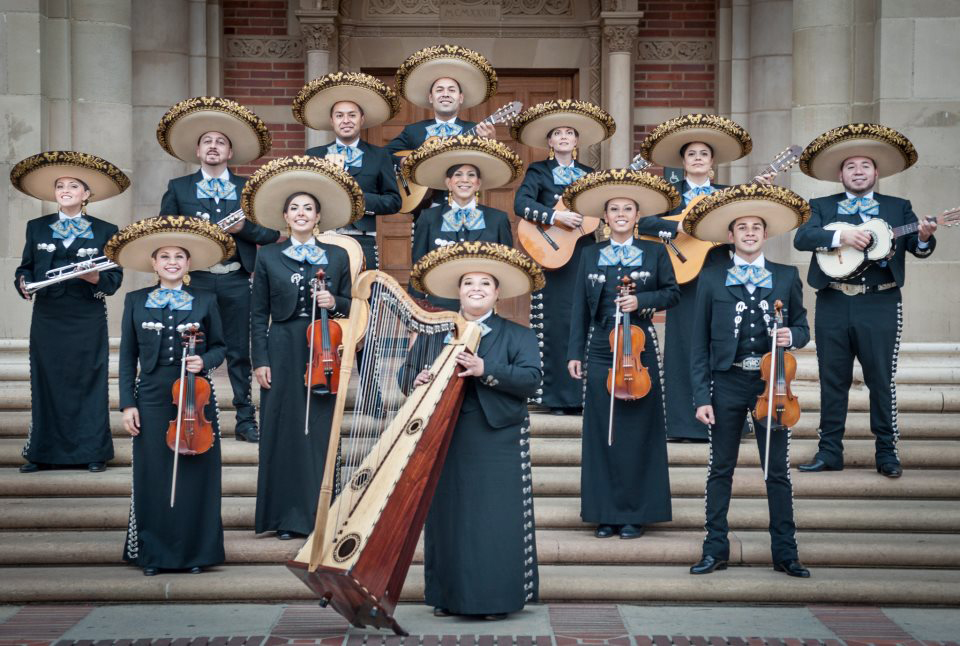Mariachi de UCLAtlán to celebrate Día de los Muertos with performance

Mariachi de UCLAtlán will perform its Día de los Muertos concert Thursday at the Fowler Museum. The ensemble will play traditional mariachi and music keeping in tone with Día de los Muertos, including “La Llorana.”
(Courtesy of Jaw Lee)
By Christina Vo
Oct. 30, 2014 1:41 a.m.
The booming sound of trumpets and violins burst through the air in the Schoenberg Music Building every Monday and Wednesday night as members of Mariachi de UCLAtlán rehearse for their Día de los Muertos performance.
The group has been practicing for the performance since September. The performance will be at the Fowler Museum’s Art Council Amphitheater on Thursday. Mariachi de UCLAtlán will be playing themed music for Día de los Muertos, a Mexican holiday that celebrates life and honors those who have died, as well as some traditional mariachi songs.
The ensemble will play traditional mariachi songs such as “El Son de la Negra.” The performance will also keep the somber tone of Día de los Muertos by playing songs like “La Llorona,” a song based on the urban legend of a weeping woman who wanders around looking for her children, and “La Bruja,” a song about a witch who prowls for men.
Originating in Western Mexico in the 18th century, mariachi became standardized in the 20th century when it spread from rural areas to urban areas like Mexico City. There, it began receiving more radio play and became featured in movies of the Golden Age of Mexican cinema of the 20th century, said Jessie Vallejo, co-director and violinist of Mariachi de UCLAtlán.
Though it was formed in 1961, Mariachi de UCLAtlán has gone through periods of dormancy because they lacked a leader during some years. Latin American studies graduate student Mary Alfaro said it was revived in 2006, when she, ethnomusicology graduate student Leticia Soto and UCLA alumna Lauryn Salazar were inspired to revive it by ethnomusicology lecturer and the group’s coach, Jesús Guzmán.
Alfaro said she, Salazar and Soto felt that it was a shame not to use such a great resource in Guzmán, one of the top mariachi musicians and leader of Mariachi los Camperos de Nati Cano, one of the biggest mariachi groups in the United States.
“Ever since the group restarted, it seems like the goal has been to play more challenging pieces as members have stayed on longer,” trumpeter and administrative specialist at the Design | Media Arts department Taña Barajas said. “(Guzmán’s) been working with us on larger and longer show pieces that we can take to competitions and exhibition events.”
Vallejo said the music for these show-style performances involves more complicated song arrangements and the use of a larger group, which can create a larger sound and thicker texture with more harmonies from trumpets and violins added in.
The performance approach aims to bring mariachi music from its standard mariachi gigs to the big shows and performances that Mariachi de UCLAtlán now put on.
“I did some innovations (to the arrangements), but I stay in the line,” Guzmán said. “I’m traditional. I stay with the mariachi sound and I try to keep the style from the 1960s.”
Mariachi de UCLAtlán’s closeness to tradition is reflected in Guzmán’s song arrangements. Vallejo said the actual melodies and how the musicians articulate the notes, such as how one strums the guitar or how one bows the violin, aim for a traditional feel from the 1960s.
Vihuela player and second-year ethnomusicology student Christian Ortiz said he hopes their Día de los Muertos performance will be one of many that can carry on Natividad Cano’s mission to show the complexity and passion of mariachi.
“Día de los Muertos is a celebration of life and that’s exactly what I hope to transmit to the audience: life,” Ortiz said. “I hope there is an array of audiences there. Mariachi isn’t only for Mexicans. It’s a very versatile music and can be enjoyed by peoples of every corner of the world.”


